An organic agricultural system promotes and enhances the health of the agroecosystem, including biodiversity, soil biological activity, and the biological cycle. Organic farming is increasingly popular because products produced under organic methods are more healthy and safe, besides fetching higher price premiums than those produced under inorganic farming.
Therefore, the Karnataka government outlined a broad-based organic farming policy called Savayava BhagyaYojane(SBY). Initially, the state government selected villages in every district and promoted organic farming experimentally; those villages are called “Organic Village”. Assistance is being extended for establishing organic manure production units viz., vermicompost, Compost, Bio-digester, Azolla, cattle urine collection pits, cement structures for liquid-manures/ panchhagavya/ jeevamruta/ beejamruta in each project areas (100 ha).
Assistance is also being given for the flooring of cattle sheds for the collection of urine & dung. In addition, organic manures, viz., green manure seeds, concentrated manures, oilcake, and bio-fertilizers, are being distributed to the farmers at subsidized rates. Further, assistance is also being extended for collection at the cluster level, grading, packing, branding, and marketing of organic produce.
Karnataka organic farming
Major crops in Karnataka
Paddy
The paddy crop is one of Karnataka’s most important food crops. Among the people of Karnataka, rice is their staple food. Paddy is grown in 28.2% of the total cultivable land. Paddy is grown in all the districts of Karnataka. The Krishna Tungabhadra, Cauvery, and coastal districts are famous for paddy cultivation. Raichur district stands first in the production of paddy.
Sugarcane
Sugarcane is Karnataka’se most important commercial and industrial crop. Karnataka ranks fourth in the production of sugarcane. It contains sucrose, and it is used to produce jaggery and sugar. Being an annual crop, sugarcane requires an irrigation facility. Belagavi is the leading sugarcane producer in Karnataka, followed by Bagalkot, Mandya, Mysuru, Shivamogga, Davanagere, Hassan, Koppal, Vijayapura, Bidar, Ballari and Haveri are important sugarcane-growing areas.
In case you missed it: Top 15 Agritech Startups Helping Farmers in India: Smart Farming for High Yields and Low Pests and Disease
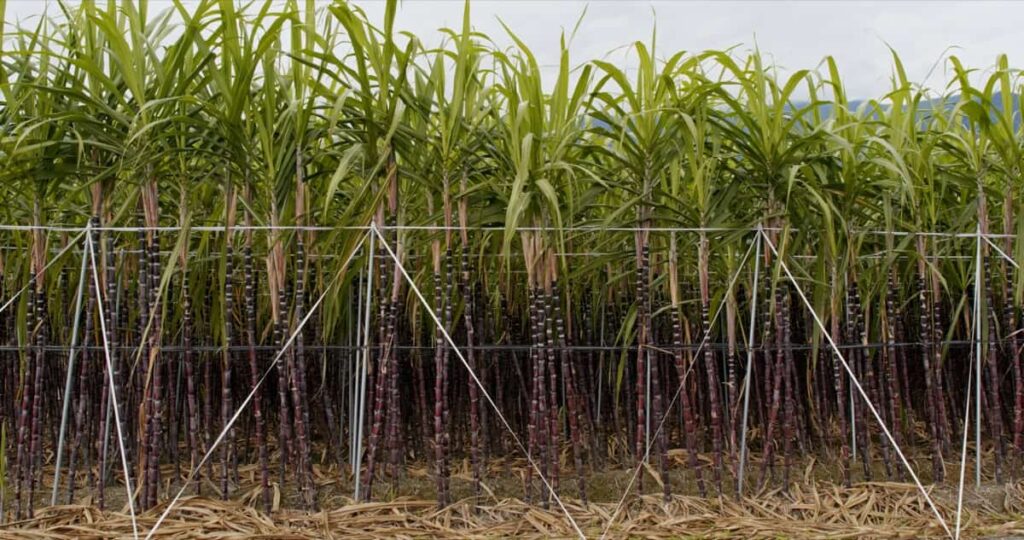
Cotton
Cotton is a fiber crop. It provides raw materials for cotton textiles. Besides, it is used for making carpets, beds, and pillows. Moreover, cooking oil is produced from cotton seeds. Moreover, cotton seed cake is used as cattle feed. The main cotton-producing districts of Karnataka are Haveri, Dharwad, Gadag, Mysuru, Ballari, Raichur, Kalaburagi, Belagavi, Davanagere, Chitradurga, Koppal, and Vijayapura. Among these, the Haveri district ranks first in cotton production in the state. Dharwad district ranks second.
Tobacco
It belongs to the nicotiana group. It contains an intoxicating substance called nicotine. Tobacco is used to manufacture beedis, cigarettes, cigars, and snuff. The Portuguese introduced tobacco in the 17th century in India. Subsequently, people started growing it in Karnataka. Presently, it is a major commercial crop in the state. Karnataka ranks fourth among the tobacco-growing states in India. Mysore district occupies the first position in the production of tobacco.
Coffee
Coffee is Karnataka’s famous plantation and beverage crop. Karnataka ranks first in the production of coffee in India. Karnataka produces two types of coffee, namely Coffee Arabica and coffee Robusta. Arabica is of better quality and enjoys great demand in the international market. Coffee is grown largely in the Kodagu district. After Kodagu, Chikkamagaluru, Hassan, Shivamogga, Chamarajnagar, and Dakshina Kannada are important for coffee-growing districts.
Organic vegetable farming in Karnataka
Because of growing awareness of health and environmental issues, organic farming, especially vegetables, is gaining momentum worldwide and emerging fast as an attractive source of rural income generation. Organic products are increasingly preferred in developed countries and major urban centers in India.
There is high demand for organic food in the domestic and international market, which is growing around 20-25 percent annually; as a result, the area under organic farming has been increasing consistently. Karnataka, with its varied climate and variety of soils, has enormous potential for organic vegetable production.
List of vegetables growing in Karnataka
| Vegetable | Areas growing | Organic crop yield | Crop duration |
| Onion | Challakere Molkalmuru Chitradurga Hiriyur | 10-12 tons per acre | 80-150 Days |
| Cabbage | Talavadi, Kolar | 28-32 tons per acre | 120-150 Days |
| Beans | Tumkur Kolar Mulbagal Devanahalli Doddaballapura Chickballapur | 20-25 quintals per acre | 100-120 Days |
| Tomato | Kolar Chikkaballapur, Mandya Belagavi Haveri Davangere Srinivaspur Bangarpet Belgaum Districts | 20-24 tons per acre | 60-100 Days |
| Cucumber | Mysore, Doddaballapur, Hoskote, and Anekal | 60 to 80 quintals per acre | 45-60 Days |
| Chilli | DharwadShimoga Chitradurga | 6 to 10 quintals per acre | 90-100 Days |
| Okra | Mandya Ramanagar Devanahalli Doddaballapura Chickballapur | 5-6 tons per acre | 45-50 Days |
In case you missed it: Nutritional Deficiencies in Tomato Crop: How to Fix, Solutions, and Treatment
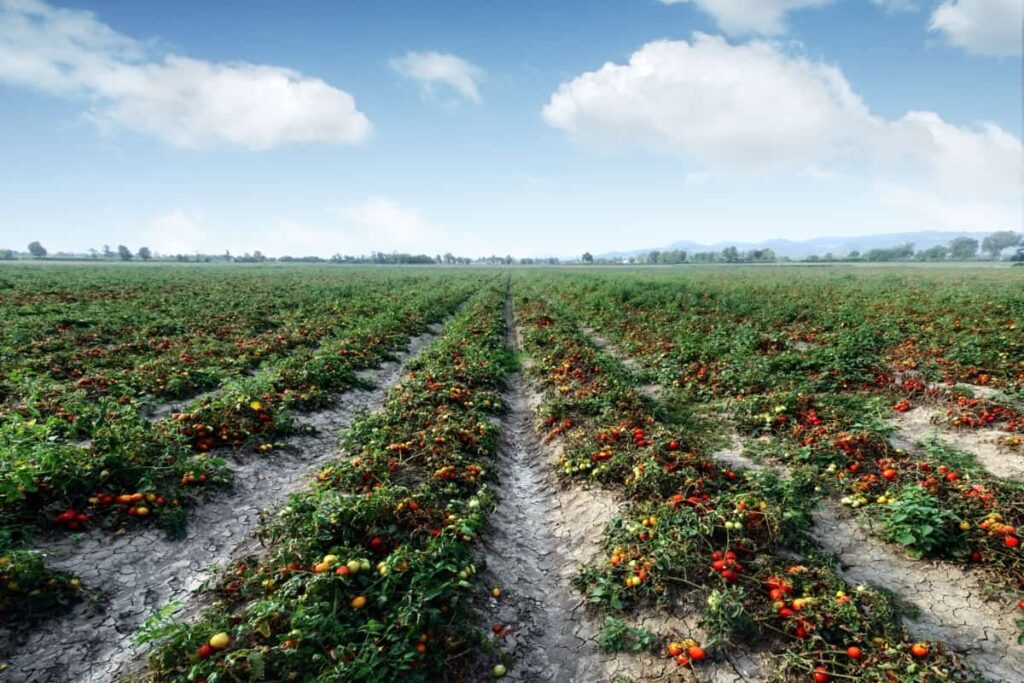
Organic fruit farming in Karnataka
Karnataka’s economy is heavily dependent on agriculture. Agricultural activities are well suited to Karnataka’s topography, soil, and climate. In Karnataka, crop production employs most of the population, especially in rural areas. Approximately 64.6% of Karnataka’s total land area is devoted to agriculture, which occupies 12.31 million hectares.
The state of Karnataka also has a great deal of potential for horticultural production, second only to India in terms of production. The agriculture sector is implementing a major development plan and strategy in Karnataka to increase productivity, which will significantly boost the state’s economy.
List of fruits growing in Karnataka
| Vegetable | Areas growing | Organic crop yield |
| Banana | Hosapete Kampli Chitradurga Bagalkot Chickballapur | 20-24 tons per acre |
| Mango | Gadag Kolar Chikmaglur | 6-7 tons per acre |
| Pomegranate | Chickballapur Gadag Bagalkot Dakshina Kannada districts | 15-20 kg per plant |
| Grape | Bagalkot Chickballapur Dakshina Kannada districts | 6-8 tons per acre |
| Papaya | Chickballapur Gadag Bellary Bidar Bagalkot Kolar Dakshina Kannada districts | 24-30 tons per acre |
| Sapota | Bagalkot Chickballapur Dakshina Kannada districts | 250-2500 fruits per plant |
In case you missed it: Growing Banana Organically in Maharashtra: Cultivation Practices and Production Management
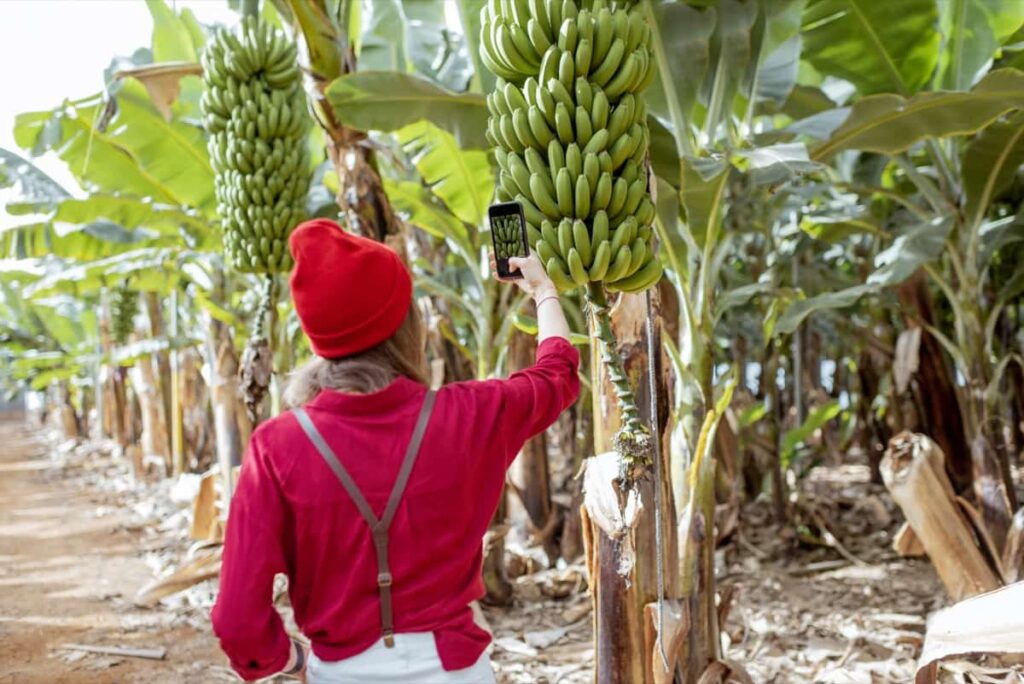
Organic Millets farming in Karnataka
Evidence suggests millets were consumed during the Indus Valley civilization when they were first domesticated in India. In India, millet was first cultivated, which today is cultivated worldwide. It is a traditional food for over half a billion people across Asia and Africa; millet is grown in more than 130 countries. Compared to other staple foods in India, millets are primarily a Kharif crop, which uses less water and agricultural inputs. Karnataka is promoting millets as nutri-cereals that are good to eat and grow and kind on the planet.
The Department of Agriculture is taking up millet production and promotional programs. The perception of ragi (finger millets) and Jowar (sorghum), the state’s principal millets, as the poor’s food is changing mainly among those with lifestyle diseases. Karnataka has developed a brand called “Siri” for millets, as they are referred to as ‘siridhanya’ or rich grains. Karnataka has started implementing the distribution of millets through PDS -where the grains are sourced and distributed locally.
Today, Karnataka is one of the country’s leading producers and consumers of millet. All over the world, millets play an important role in generating livelihood, increasing farmers’ income, and ensuring food and nutritional security. The state government recently launched a Karnataka Organic Farming Policy to enable millet farming to move to a new level. In addition to providing minor millet farmers with a subsidy of Rs 4000 per hectare, Rs 10 lakh is also available to subsidize millet processing machinery.
List of Millets growing in Karnataka
| Millets | Areas growing | Organic crop yield | Crop duration |
| Pearl Millet (Bajra) | Bidar Gulbarga Raichur Bagalkot Bijapur Bellary Davangere Koppal Gadag Dharwad Belgaum | 8 quintals per acre | 70-80 days |
| Sorghum | Bidar Gulbarga Raichur Bagalkot Bijapur Bellary Davangere Koppal Gadag Dharwad Belgaum Haveri Gadag | 12 quintals per acre | 110-115 days |
| Ragi | Davangere Chitradurga Tumkur Hassan Chikkamagalur Tumkur Bangalore (Urban) Bangalore (Rural) Kolar, hikkaballapur Mysore Chamarajanagar Mandya Shimoga Belgaum Dharwad Haveri Gadag Uttar Kannada Kodagu | 10-12 quintals per acre | 125-135 days |
| Proso Millets | Belgaum Haveri Dharwad Gadag | 5-7 quintals per acre | 60-100 days |
| Barnyard | Bagalkot Bellary Belagavi Bengalur Chamarajanagar Chikkaballapur Chikkamagaluru | 6-8 quintals per acre | 90-100 days |
In case you missed it: Growing Pearl Millet/Bajra Organically in Rajasthan: Step-by-Step Farming Practices and Production
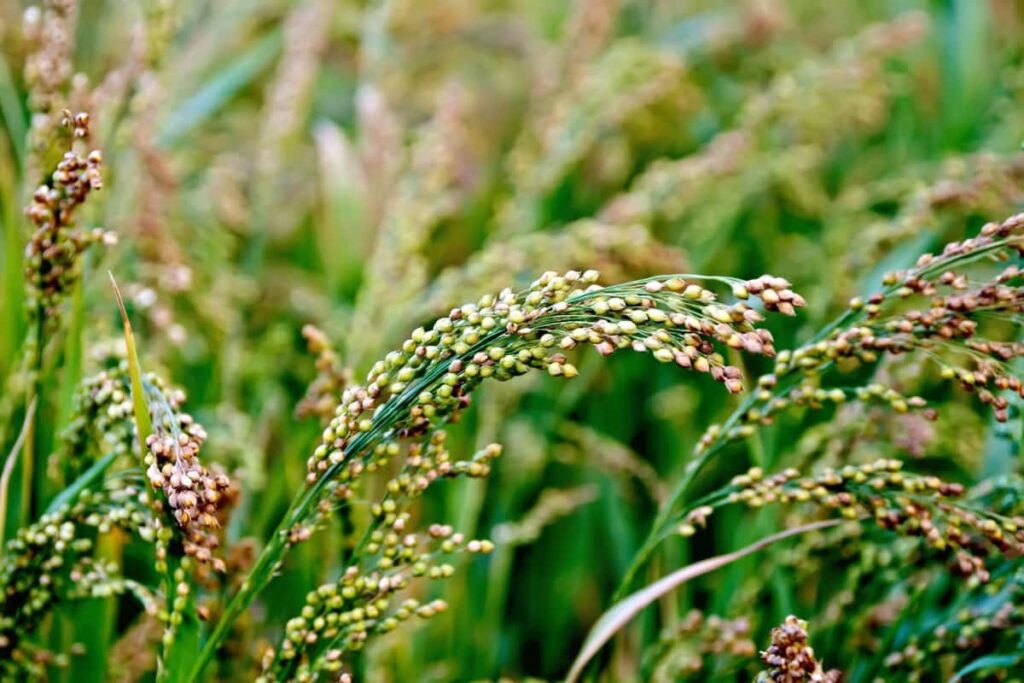
Organic livestock farming in Karnataka
The Animal husbandry and livestock sector play an important role in the rural economy of Karnataka. Animal husbandry plays a vital role and provides an additional source of income to the country’s farmers. Animal products, for a long, have also played an important role in the country’s socio-economic life. It has been a rich source of high-quality animal products that have added greater nutritional value to the diet of farmers and other consumers. Products derived from animal husbandry mainly include milk, meat, and eggs.
India is the world’s largest milk producer, accounting for 16.43 percent of global milk production. It also accounts for 4.95 percent of the world’s egg production. India has the world’s largest population of milch animals, comprising 190.9 million cows, 108.7 million buffaloes, 135 million goats, and 65 million sheep in 2021. The major items of export include sheep/goat meat, buffalo meat, poultry products, dairy products, animal casing, natural honey, processed and other kinds of meat.
In case you missed it: Common Dairy Cattle Diseases, Symptoms, and Treatment: Check How this Guide Helps Dairy Farmers
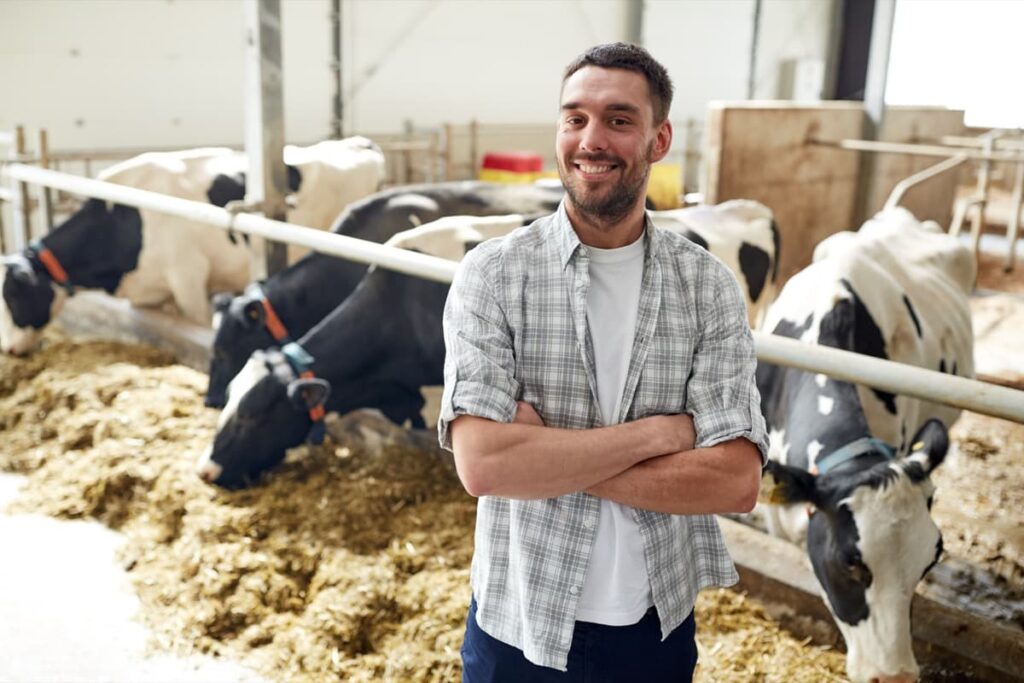
Cattle development
For the development of cattle in the state, Indigenous breeds like Hallikar, Amrithmahal, and Khillar are given importance by selective breeding in the livestock farms located at Kunikenahalli in Tumkur, Ajjampura in Chikmagalur and Bankapura in Haveri districts respectively.
The production capacity of Amrithmahal breed cows is estimated at elite females being identified, and Amrithmahal Breeders’ cooperative societies are being formed. Frozen semen doses required for artificial insemination are produced at Hessaraghatta and Dharwad Frozen Semen Centers and supplied for breeding purposes.
Piggery development
Currently, the state has five pig breeding stations in the districts of Bengaluru, Kodagu, Dakshina Kannada, Bangarpet, and Chikmagalur. These stations also provide training and extension services in modern pig rearing and producing and distributing purebred piglets.
In the state, most unemployed educated youths and farmers are interested in modern pig rearing. Consequently, producing good quality pork and the lifestyle of the pig rearers are being promoted. Under the RKVY scheme, Pig Breeders co-op societies have been established to provide good quality pork and marketing facility.
Organic aquaculture in Karnataka
The state of Karnataka is blessed with abundant marine and freshwater resources. It has 320 km of coastline along with three districts, Dakshina Kannada, Udupi, and Uttara Kannada. It has a 27,000 sq km continental shelf and 87,000 sq km exclusive economic zone, and 20000 acres of brackish water resources. Yadgir, a backward district, ranks first among inland fish production in the state. The organic aquaculture process is a long-term ecological and environmentally sustainable practice.
Humane and sustainable aquaculture practices are essential for raising aquatic products that are pollution-free and sustainable. Good health management practices minimize stress by providing free movement, suitable living conditions, and an optimum stocking ratio relative to the carrying capacity of the farming system. Furthermore, organic feed containing fishmeal should come from certified sustainable sources. Various fish species can be found in the lakes of Karnataka, including Rohu, Mrigal, Tilapia, and Catla.
There is some preservation of the natural habitat required for fish growth. By incorporating organic farming wastes, such as poultry droppings, organic manure, etc., into the pond, phytoplankton breeding can be promoted. Additionally, extra food is provided in moist or dry forms. Floating pellets may be given to fish that eat from the upper layers, while sinking pellets may be given to fish that eat from the lower layers.
How to get organic certification in Karnataka
- A person (a farmer/ group of farmers/processor/ trader) looking for an organic farming certificate for their agricultural produce must ensure that their farm conforms to the standards laid out by the National Programme for Organic Production (NPOP) for organic crop production.
- They must submit an application in the requisite format along with the fee and complete field verification as specified by the National Programme for Organic Production (NPOP). All the information as requested by the Karnataka State Organic Certification Agency (KSOCA) in the application must be provided, such as the name, addresses, details of the contact person, field location, and details of the group must be completed, signed, and returned to the office for registration.
- The evaluator will send the operator the offer letter (estimating the inspection and certification fees) and the agreement once the evaluator scrutinizes and accepts the application. The same will be communicated if the client is not accepted for certification due to technical reasons.
- Operators are registered on the tracenet. Along with the application form, the requested person must pay the registration fee, field inspection fee, and one-time travel cost.
- In consultation with the operator, fix an inspection date and send the inspection intimation letter along with a copy of the farm records.
- The inspection will be conducted the day the agreement is finalized, and the operator will receive a copy of the signed contract. An inspection report will be provided to the operator during the inspection. In addition, an evaluator receives a detailed inspection report.
- Tracenet entries include the detailed crop list, the major and minor nonconformities, and the corrective action deadline.
- As for group farmers, the CB verifies their data and enters major and minor nonconformities along with a deadline for corrective action.
- The evaluator receives full payment, reviews the operator’s file, and submits it to the Certification committee.
- Based on the corrective measures taken by the operator against the nonconformities raised in the inspection report, the Certification committee makes its final decision
- A certificate will be generated by the Quality Manager and sent to the operator through the tracenet.
- Before printing, the draft of the labels must be verified and approved by the certification agency office.
In case you missed it: Growing Jowar (Sorghum) Organically in Maharashtra: Step-By-Step Cultivation Process and Production
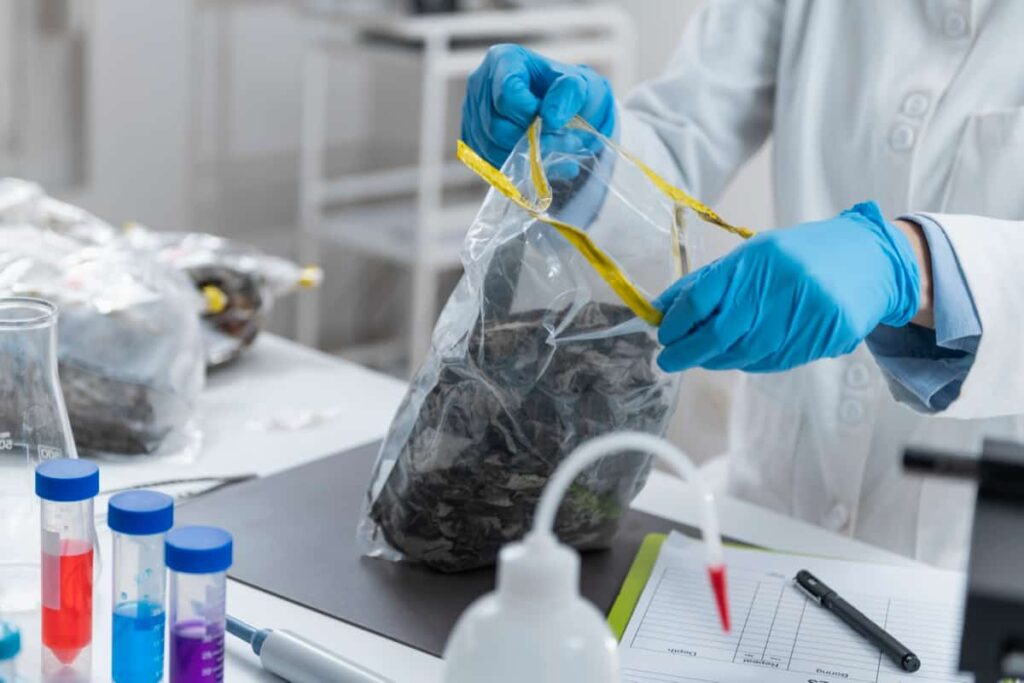
Conclusion
Karnataka state is bestowed with divergent climatic and soil types spread across agro-climatic zones. The physical features of Karnataka include coastal plains, Western Ghats, and plateau, enabling it to grow various crops. The state is also known for its excellence in horticultural crops and animal husbandry.
In addition, many state farmers are pioneers in organic agriculture and have developed many different cultivation systems through an indigenous knowledge base. Furthermore, they have developed methods of using organic wastes and holistic pest control agents to control pests and diseases. If you are planning for organic farming in the following districts of Karnataka, the above blog post will help with the basics of organic cultivation.
| Bagalkot | Haveri |
| Ballari | kalaburagi |
| Bangalore Rural | Kodagu |
| Belagavi | Kolar |
| Bengaluru | Koppal |
| Bidar | Mandya |
| Chamarajanagar | Mysuru |
| Chikballapur | Raichur |
| Chikkamagaluru | Ramanagara |
| Chitradurga | Shivamogga |
| Dakshina Kannada | Tumakuru |
| Davanagere | Udupi |
| Dharwad | Uttara Kannada |
| Gadag | Vijayapura |
| Hassan | Yadgir |
- Profitable Village Farming Business Ideas in 2024
- High-Yield Aquaculture: Fast-Growing Fish for Farming
- Effective Fish Pond Construction Techniques for Beginners
- Irrigation and Water Management in Pineapple Farming
- Blossom to Harvest: Mastering Flowering and Pollination in Papaya Farming
- Pig Fattening Essentials: From Selection to Sale for Beginners
- Raising Wagyu Cattle: A Complete Guide for Premium Beef Production
- Soil Types and Their Water Holding Capacity
- Optimizing Irrigation Schedules for Coconut Groves for Enhanced Yield
- Espresso Your Garden: Coffee Grounds for Healthier Acid-Loving Plants
- The Best Soil Mix for Snake Plants: How to Mix Your Own Snake Plant Soil
- Green Thumb Success: Expert Tips for Cultivating Greenhouse Beans All Year Round
- Bloom All Year Round: The Ultimate Guide to Indoor Hyacinth Care
- Eco-Friendly Gardening: How to Make Liquid Fertilizer from Kitchen Waste
- Ultimate Guide to Grow Anise in Pots: Explore Seed Propagation to Harvesting
- Guide to Raising Chester White Pigs: Discover Breed Facts to Growth Management
- Mastering the Elegance: The Ultimate Guide to Weeping Cherry Tree Care, Planting, and Maintenance
- Ultimate Guide to Planting Garlic in Grow Bags: Growing Strategies for Beginners
- How to Fix Spider Plant Leaf-Related Problems: Natural and Organic Remedies
- 10 Reasons Why Your Tulsi Plant is Shedding Leaves: Home Remedies and Solutions
- Optimizing Growth and Yield: The Advantages of Palm Bunch Ash Fertilizer
- Utilizing Neem Oil Extract as a Natural Pesticide for Hydrangea
- From Soil to Harvest: Various Ways in Which Farmers Can Use AI Tools
- Steps to Encourage and Induce Citrus Flowers: A Comprehensive Guide
- How to Fix Snake Plant Leaf-Related Issues: Natural and Organic Remedies
- Transform Your Garden into a Fragrant Oasis with Raat Ki Rani (Night Blooming Jasmine)
- Discover the Ideal Chicken Breeds for Philippine Farms
- How to Create a Poultry Egg Farm Business Plan for Profits
- Grow Lemon Cucumbers Like a Pro: Insider Techniques for Bountiful Yields
- Ultimate Guide to Caring for Your Pink Princess Philodendron: Tips for Thriving Variegation
- Areca Nut Profit Per Acre: Calculating Yield and Cost of Cultivation
- How Kaveri Chicken is Becoming a More Profitable Breed in Indian Backyards
- Transform Your Barn: 9 Steps to Convert a Horse Stall into a Chicken Coop
- Exploring Suffolk Sheep Disadvantages with Limitations and Challenges
- Guide to Solving Potted Lemon Tree Problems: How to Revive Lemon Tree in Containers
- Steps to Encourage Female Pumpkin Flowers: Best Strategies for More Flowers and High Yields
